
Favela is an umbrella name for several types of working-class neighborhoods in Brazil. The term, which means slum or ghetto, was first used in the Slum of Providência in the center of Rio de Janeiro in the late 19th century, which was built by soldiers who had lived under the favela trees in Bahia and had nowhere to live following the Canudos War. Some of the last settlements were called bairros africanos. Over the years, many former enslaved Africans moved in. Even before the first favela came into being, poor citizens were pushed away from the city and forced to live in the far suburbs.

Rocinha is the second largest favela in Brazil, located in Rio de Janeiro's South Zone between the districts of São Conrado and Gávea. Rocinha is built on a steep hillside overlooking Rio de Janeiro, and is located about one kilometre from a nearby beach. Most of the favela is on a very steep hill, with many trees surrounding it. Around 200,000 people live in Rocinha, making it the most populous favela in Brazil.

Human rights in Brazil include the right to life and freedom of speech; and condemnation of slavery and torture. The nation ratified the American Convention on Human Rights. The 2017 Freedom in the World report by Freedom House gives Brazil a score of "2" for both political rights and civil liberties; "1" represents the most free, and "7", the least.
Kátia Lund is a Brazilian film director and screenwriter. Her most notable work was as co-director of the film City of God.

In Brazil, the Federal Constitution establishes eight law enforcement institutions - seven titulars and one auxiliar. The titular institutions are: the Federal Police, the Federal Highway Police, the Federal Railroad Police, the Federal Penal Police, the State Military Police and Fire Brigade, the State Civil Police and the State Penal Police. Of these, the first four are affiliated to federal authorities and the latter three are subordinated to state governments. These public safety institutions are part of the Executive branch of either federal or state government. Apart from these eight institutions, there are others which affiliate to municipal authorities: the Municipal Guards. According to Minister Alexandre de Moraes of the Supreme Federal Court, "...the Municipal Guards are inserted in public safety as the auxiliary and related body of public security force..." Federal law 13,022 gave them de facto and de jure police attributions.

Comando Vermelho, also known as CV, is a Brazilian criminal organization engaged primarily in drug trafficking, arms trafficking, protection racketeering, kidnapping-for-ransom, hijacking of armored trucks, loansharking, irregular warfare, narco-terrorism, and turf wars against rival criminal organizations, such as Primeiro Comando da Capital and Terceiro Comando Puro. The gang formed in 1979 out of a prison alliance between common criminals and leftist guerrillas who were imprisoned together at Cândido Mendes, a maximum-security prison on the island of Ilha Grande. The prisoners formed the alliance to protect themselves from prison violence and guard-inflicted brutality; as the group coalesced, the common criminals were infused with leftist social justice ideals by the guerrillas. In 1979, prison officials labeled the alliance "Comando Vermelho", a name which the prisoners eventually co-opted as their own. In the 1980s, the gang expanded beyond Ilha Grande into other prisons and the favelas of Rio de Janeiro, and became involved in the rapidly growing cocaine industry. Meanwhile, Brazil's shift towards democracy and the eventual end of the military dictatorship in 1985 allowed the leftist guerrillas to re-enter society; thus, the CV largely abandoned its left-wing ideology.
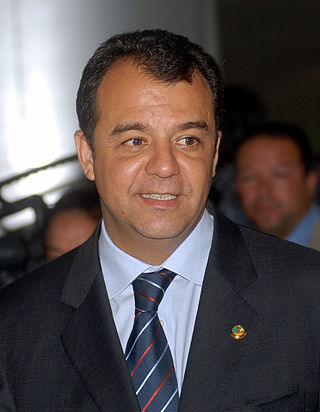
Sérgio de Oliveira Cabral Santos Filho is a Brazilian politician and a journalist
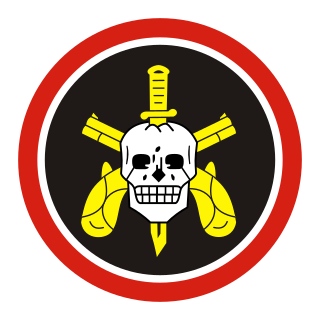
Batalhão de Operações Policiais Especiais (BOPE) or BOPE is the police tactical unit and gendarmerie of the Military Police of Rio de Janeiro State (PMERJ) in Brazil. Due to the nature of crime in favelas, BOPE units utilize equipment deemed more powerful than traditional civilian law enforcement, and have extensive experience in urban warfare as well as progression in confined and restricted environments.
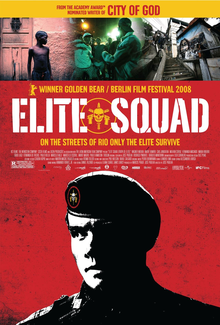
Elite Squad is a 2007 Brazilian crime film based on the novel Elite da Tropa by Luiz Eduardo Soares, André Batista, and Rodrigo Pimentel. Directed by José Padilha, the film stars Wagner Moura, Caio Junqueira, and André Ramiro, and tells the story of Roberto Nascimento (Moura), a captain with the Batalhão de Operações Policiais Especiais, or BOPE, who leads a police crackdown on a series of Rio de Janeiro favelas in-preparation for the Brazilian state visit of Pope John Paul II.

The Vigário Geral Massacre occurred on August 29, 1993, at the favela of Vigário Geral, located in the north of Rio de Janeiro city. A death squad composed of Rio Military Police was responsible for carrying out the act of violence. The group supposedly did so out of revenge for the killing of four police officers two days prior, who were allegedly involved in the extortion of drug traffickers. After arriving to the favela of Vigário Geral on August 29, 1993, the squad spent two hours traveling around wearing hoods over their heads and sporadically shooting at local residents, leaving 21 innocent people dead. "Among the deceased were seven men playing cards in a bar and eight members of a family, including a 15-year-old girl, killed inside their home." After the federal and Rio de Janeiro state governments commenced a series of official investigations that year, charges were brought against thirty three people: twenty-eight military policemen who were believed to belong to infamous death squad "Cavalos Corredores", three civil policemen and two civilian employees of the civil police. By 1998, the number of people charged increased to the total of fifty-two, but only two had actually been convicted thus far. Six policeman had been convicted as of 2003, yet according to a BBC newspaper published in August, only two were actually in prison as the other four were released with the expiration of the time periods for their appeal hearings.

Complexo do Alemão is a group of favelas in the North Zone of Rio de Janeiro, Brazil.

Crime in Brazil involves an elevated incidence of violent and non-violent crimes. Brazil's homicide rate was 27.4 per 100,000 inhabitants, according to the United Nations Office on Drugs and Crime (UNODC). Brazil has the highest number of intentional homicides in the world, with 57,358 in 2018. In recent years, the homicide rate in Brazil has begun to decline. The homicide rate was 20.64 per 100,000 in 2020 with 43,879 killings, similar to 2019, but down from 30.67 per 100,000 in 2017.

The Morro da Babilônia is a hill in the Leme neighbourhood of Rio de Janeiro, separating Copacabana beach from Botafogo. It is home to a favela known by the same name, as well as the favela Chapéu Mangueira. Morro da Babilônia is an environmentally protected area.
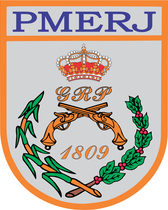
The Military Police of Rio de Janeiro State (PMERJ) like other military polices in Brazil is a reserve and ancillary force of the Brazilian Army, and part of the System of Public Security and Brazilian Social Protection. Its members are called "state military" personnel.
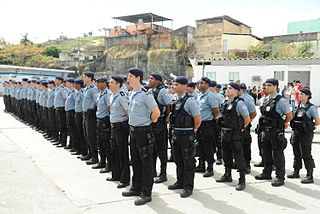
The Pacifying Police Unit, abbreviated UPP, is a law enforcement and social services program pioneered in the state of Rio de Janeiro, Brazil, which aims to reclaim territories, most commonly favelas, controlled by gangs of drug dealers. The program was created and implemented by State Public Security Secretary José Mariano Beltrame, with the backing of Rio Governor Sérgio Cabral. The stated goal of Rio's government is to install 40 UPPs by 2014. By May 2013, 231 favelas had come under the UPP umbrella. The UPP program scored initial success expelling gangs, and won broad praise. But the expensive initiative expanded too far, too fast into dozens of favelas as state finances cratered, causing a devastating backslide that enabled gangs to recover some of their lost grip.

Maria das Graças Foster, commonly known as Graça Foster, is a Brazilian business executive and chemical engineer. She was the CEO of Petrobras-Petróleo Brasil, Brazil's state-controlled oil company, which is located in Rio de Janeiro. She was the first woman in the world to head a major oil-and-gas company. In April 2012, she was listed on the Time 100 list of the most influential people in the world. In 2014, she was recognized as the 16th most powerful woman in the world by Forbes magazine. She was ranked by Fortune in 2013 as "the Most Powerful Woman in Business" for the second year in a row.

Maré is a neighborhood and favela in the North Zone of Rio de Janeiro, Brazil. It is a grouping of several favelas, suburbs with houses, and housing complexes. With approximately 130,000 residents, it is one of the largest slum complexes in Rio de Janeiro, a consequence of the low indicators of social development that characterize the region.
On July 14, 2013, Amarildo de Souza, a 43-year-old bricklayer from the Rocinha favela in Rio de Janeiro, Brazil, was called in for questioning by Unidade de Polícia Pacificadora (UPP) officers on his way home from the market. Believed to be connected to drug trafficking activity in the favela despite having no prior involvement in illegal activity, de Souza was brought in for questioning during Operation Armed Peace, during which roughly 300 officers from Rocinha's UPP force flooded the favela in order to arrest drug traffickers. It was during this two-day long raid that de Souza was brought to the police station and never seen again.

Marielle Franco was a Brazilian politician, sociologist, feminist, socialist and human rights activist. Franco served as a city councillor of the Municipal Chamber of Rio de Janeiro for the Socialism and Liberty Party (PSOL) from January 2017 until her assassination.

An ongoing conflict between Brazilian militias, organized criminal groups Comando Vermelho, Amigos dos Amigos, Terceiro Comando Puro and the Brazilian state, has taken place primarily in Rio de Janeiro since 2006.


















